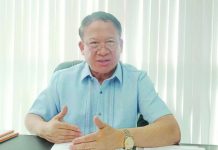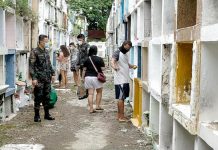
BY FR. SHAY CULLEN
THE HEALTHIEST people I have ever met are the upland Aeta farmers of Zambales.
In Cabangan, I met Jun Garcia and his wife Maria. They are sustenance farmers living off what food they grow and selling any surplus in the local market. They have six children and say they are not rich but not poor either.
“Our lives are simple here, peaceful, surrounded by nature and we never go hungry and we have no sickness in the family,” Maria says.
They grow their own organic vegetables, fruit, corn and mangos and raise free range chicken. They live a healthy life, free of diseases like stomach illness and diabetes.
Living close to nature surrounded by trees and streams and with no internet connection, they are free from the social and moral negativity spread by the Internet and social media. They have a radio and their children go to school.
They are not rich but are not poor either. They, like their neighbors, live in a simple house made of bamboo and grass roof but they are content. They are improving their income as there is an expanding demand for their once unsaleable pico and Indian variety mangos. This demand in the export market for organic mangos and bananas is growing and earning them high fair-trade prices with the help of the Profairtrade Development Enterprise.
Now, the farmers want to sell their bananas to make organic banana chips for export but cannot because Philippine government regulations and bureaucracy does not allow them to buy 30 sacks of regulated, white organic sugar. Is that because the farmers and PDE are too small an enterprise? The EU wants Philippine-certified organic banana chips.
Hopefully, the ever helpful and efficient Pablo Luis S. Azcona, administrator of the Sugar Regulatory Administration, and his team, will come to their rescue, advised and inspired by the very vigilant and helpful Assistant Secretary Atty. Agaton Teodoro O. Uvero of the Philippine Fair Trade Group (FTG) that will help promote fairness in trading for the small producer. I will tell you how later.
Juan and Maria are among the 562 members of the Profairtrade Development Enterprise that helps the fair trade organic farmers association in Zambales. Together, the farmers delivered 81 tons of fresh pico/carabao mangoes this harvest. After processing the mangos in the factory in Bulacan, there were 41 tons of EU standard certified organic mango puree for export to Germany. The only EU certified organic mango puree in the Philippines, they say.
The mangoes were of irregular size, scratched, stained and not sweet tasting but great for processing in the Bulacan plant and making organic mango puree. This turned the low value fruit into high priced puree. Likewise, the farmers harvested and delivered 31 tons of the normally unsaleable “Indian” mango variety. These were also processed into organic puree and exported to Germany. (To be continued)/PN







